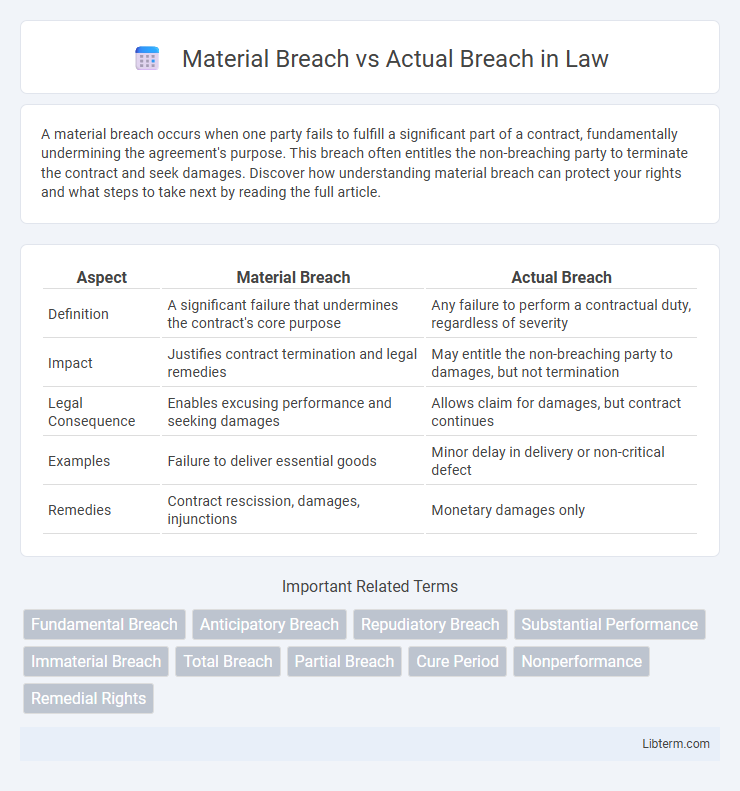A material breach occurs when one party fails to fulfill a significant part of a contract, fundamentally undermining the agreement's purpose. This breach often entitles the non-breaching party to terminate the contract and seek damages. Discover how understanding material breach can protect your rights and what steps to take next by reading the full article.
Table of Comparison
| Aspect | Material Breach | Actual Breach |
|---|---|---|
| Definition | A significant failure that undermines the contract's core purpose | Any failure to perform a contractual duty, regardless of severity |
| Impact | Justifies contract termination and legal remedies | May entitle the non-breaching party to damages, but not termination |
| Legal Consequence | Enables excusing performance and seeking damages | Allows claim for damages, but contract continues |
| Examples | Failure to deliver essential goods | Minor delay in delivery or non-critical defect |
| Remedies | Contract rescission, damages, injunctions | Monetary damages only |
Understanding Contract Breaches
Material breach occurs when a party fails to perform a significant contract obligation, fundamentally undermining the agreement's purpose and justifying termination or legal remedies. Actual breach refers to any failure to meet contractual duties, whether minor or severe, where the non-breaching party can seek damages or specific performance. Understanding the distinction between material and actual breach is crucial for enforcing contracts and determining the appropriate legal response.
Defining Material Breach
A material breach occurs when a party fails to perform a critical contractual obligation, significantly undermining the contract's purpose and justifying termination or legal remedies by the non-breaching party. Unlike an actual breach, which refers broadly to any failure to fulfill contractual duties, a material breach specifically impacts the contract's core requirements, causing substantial harm or loss. Courts evaluate factors such as the extent of non-performance, the injured party's anticipated benefits, and whether the breach defeats the contract's essential purpose to determine materiality.
Defining Actual Breach
An actual breach occurs when a party fails to perform a contractual obligation as specified, resulting in a definite violation of the contract terms. This breach is tangible and proven by concrete evidence, showing that the obligated action was not fulfilled or was improperly executed. Material breach differs by significantly impairing the contract's value, whereas actual breach emphasizes the factual occurrence of non-performance regardless of severity.
Key Differences Between Material and Actual Breach
Material breach refers to a significant violation of a contract that substantially impairs its value, justifying the injured party to terminate the agreement or seek damages. Actual breach occurs when a contractual obligation is not performed as promised, regardless of the breach's severity or impact on the contract's overall purpose. Key differences lie in the breach's effect on the contract's essence, with material breach warranting legal remedies due to substantial harm, while actual breach simply indicates non-performance that may not always entitle the aggrieved party to terminate the contract.
Legal Implications of a Material Breach
A material breach occurs when a party fails to perform a significant duty, fundamentally undermining the contract's purpose and allowing the non-breaching party to seek remedies such as contract termination or damages. Legal implications of a material breach include potential rescission, specific performance, or compensation for losses directly resulting from the breach. In contrast, an actual breach may involve minor or partial failures that do not necessarily justify contract termination but still permit enforcement of corrective measures or damages.
Legal Implications of an Actual Breach
An actual breach occurs when a party fails to fulfill contractual obligations, significantly impacting the contract's enforceability and potentially leading to damages or specific performance remedies. Legal implications include the non-breaching party's right to sue for compensatory damages, terminate the contract, or seek equitable relief depending on the breach's severity. Courts assess actual breaches based on materiality, with substantial failures triggering more severe consequences under contract law.
Examples of Material Breach
Examples of material breach include failure to deliver goods specified in a contract, non-payment of a substantial portion of the purchase price, or missing critical project deadlines that compromise the contract's purpose. Material breach significantly impairs the injured party's expected benefit from the agreement, such as when a supplier provides defective products that cannot be used. In contrast, an actual breach refers to any violation of contract terms, which may be minor and not necessarily undermine the contract's overall intent.
Examples of Actual Breach
Actual breach occurs when one party fails to perform their contractual obligations as specified, such as missing a payment deadline or delivering goods that do not meet agreed specifications. For example, a supplier delivering defective products or a tenant failing to pay rent on time exemplify actual breach scenarios. Unlike material breach, actual breach may not always justify contract termination but entitles the non-breaching party to remedies for losses incurred.
Remedies for Breach of Contract
Material breach occurs when a party fails to perform a significant duty, allowing the non-breaching party to seek remedies such as contract termination and damages. Actual breach refers to any failure to fulfill contractual obligations, enabling the injured party to claim specific performance, damages, or contract rescission depending on the breach severity. Remedies for material breach typically include compensatory damages and contract discharge, while actual breach may warrant partial remedies like injunctions or monetary compensation.
Preventing Breaches in Contract Management
Material breach involves a fundamental failure to perform contractual obligations, significantly impacting the contract's value, while actual breach refers to any failure to fulfill contract terms, whether minor or substantial. Effective contract management employs proactive monitoring, clear communication, and detailed documentation to identify potential issues early, minimizing the risk of both material and actual breaches. Implementing robust risk assessment protocols and regular compliance reviews enhances prevention strategies, safeguarding contractual relationships and reducing legal disputes.
Material Breach Infographic

 libterm.com
libterm.com